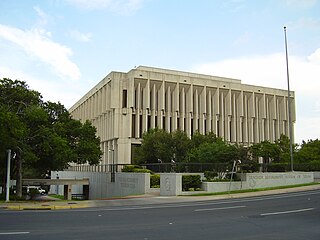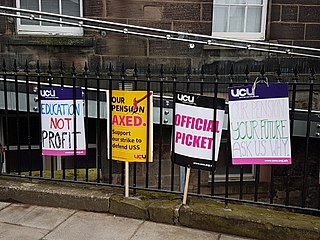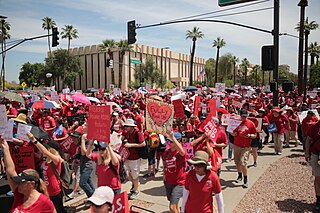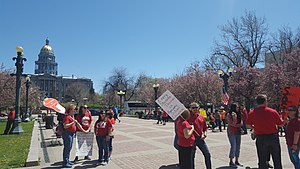
A pension is a fund into which a sum of money is added during an employee's employment years and from which payments are drawn to support the person's retirement from work in the form of periodic payments. A pension may be a "defined benefit plan", where a fixed sum is paid regularly to a person, or a "defined contribution plan", under which a fixed sum is invested that then becomes available at retirement age. Pensions should not be confused with severance pay; the former is usually paid in regular amounts for life after retirement, while the latter is typically paid as a fixed amount after involuntary termination of employment before retirement.

John Wright Hickenlooper Jr. is an American politician serving as the junior United States senator from Colorado since 2021. A member of the Democratic Party, he served as the 42nd governor of Colorado from 2011 to 2019 and as the 43rd mayor of Denver from 2003 to 2011. He was a geologist and businessman before entering politics.

The California Public Employees' Retirement System (CalPERS) is an agency in the California executive branch that "manages pension and health benefits for more than 1.5 million California public employees, retirees, and their families". In fiscal year 2020–21, CalPERS paid over $27.4 billion in retirement benefits, and over $9.74 billion in health benefits.

The Denver County School District No. 1, more commonly known as the Denver Public Schools (DPS), is the public school system in the City and County of Denver, Colorado, United States.
The pensions crisis or pensions timebomb is the predicted difficulty in paying for corporate or government employment retirement pensions in various countries, due to a difference between pension obligations and the resources set aside to fund them. The basic difficulty of the pension problem is that institutions must be sustained over far longer than the political planning horizon. Shifting demographics are causing a lower ratio of workers per retiree; contributing factors include retirees living longer, and lower birth rates. An international comparison of pension institution by countries is important to solve the pension crisis problem. There is significant debate regarding the magnitude and importance of the problem, as well as the solutions. One aspect and challenge of the "Pension timebomb" is that several countries' governments have a constitutional obligation to provide public services to its citizens, but the funding of these programs, such as healthcare are at a lack of funding, especially after the 2008 recession and the strain caused on the dependency ratio by an ageing population and a shrinking workforce, which increases costs of elderly care.

The 2005 New York City transit strike, held from December 20 through 22, 2005, was the third strike ever by the Transport Workers Union Local 100 against New York City's Transit Authority and involved between 32,000 and 34,000 strikers.

The California School Employees Association, AFL–CIO (CSEA) is the largest classified school employees labor union in the United States. CSEA represents more than 230,000 public employees in California.
United Teachers Los Angeles is the main representative of certified, non-administrative staff in the Los Angeles Unified School District. Prior to 1970, primary and secondary school teachers in Los Angeles were chiefly represented by a local of the American Federation of Teachers and the Associated Classroom Teachers of Los Angeles (ACT-LA) which was affiliated to the National Education Association. There were other smaller teachers unions active before 1970 that also merged into UTLA. Over a dozen different organizations merged to form UTLA.

Teacher Retirement System of Texas (TRS) is a public pension plan of the State of Texas. Established in 1937, TRS provides retirement and related benefits for those employed by the public schools, colleges, and universities supported by the State of Texas and manages a $180 billion trust fund established to finance member benefits. More than 1.6 million public education and higher education employees and retirees participate in the system. TRS is the largest public retirement system in Texas in both membership and assets and the sixth largest public pension fund in America. The agency is headquartered at 1000 Red River Street in the capital city of Austin.

Michael C. Johnston is an American educator and politician who served as the Colorado State Senator from the 33rd district from 2009 to 2017. A member of the Democratic Party, he was a candidate for Governor of Colorado in 2018, losing in the primary. Johnston was also a candidate for the U.S. Senate in 2020, though he withdrew from the race in September 2019.

The Fifty-third Oklahoma Legislature was the meeting of the legislative branch of the government of Oklahoma, composed of the Senate and the House of Representatives. State legislators met at the Oklahoma State Capitol in Oklahoma City from January 4, 2011, to January 8, 2013, during the first two years of the first administration of Governor Mary Fallin.
Oklahoma Teacher's Retirement System (OTRS) is the pension program for public education employees in the State of Oklahoma. As of June 30, 2014, the program had nearly 168,000 members. Public education teachers and administrators are required to be OTRS members; support staff can join voluntarily. State law established OTRS in 1943 to manage retirement funds and provide financial security for public education employees. Its first checks to retirees were sent out in 1947. It is administered by a staff and 14-member board of trustees. Its current Executive Director is Tom Spencer who started in that position on November 1, 2014.

The University and College Union (UCU), a trade union representing 110,000 staff at UK universities, ran a major series of connected strikes in 2018–22. The action has been characterised as "something of a milestone" for "impending service sector strikes of the 21st century."
The 2018 Oklahoma teachers' walkout began on April 2, 2018, with teachers across the state walking out to protest low pay, overcrowded classrooms, and tax cuts that resulted in lower state-wide education spending. It was the first such action in Oklahoma since 1990. The OEA declared an end to the walkout on April 12 after an agreement to increase salaries and state funding for education was reached. The call to end the walkout faced some objection from teachers and parents who do not believe that enough concessions were made by lawmakers.

The 2018 Arizona teachers' strike was held from April 26–May 3, 2018 by 20,000 teachers to protest low pay and cuts to school funding. Arizona Governor Doug Ducey had approved a proposal giving a 20 percent raise to teachers by 2020, with a 9 percent raise in 2019; teachers rejected this proposal as it did not provide increased funding for schools themselves or raises for support staff. It coincided with a similar strike in neighboring Colorado.

For information on all teachers' strikes in the US see: Teacher Strikes in the United States
The 2018 North Carolina teachers' rally was a rally and protest on May 16, 2018, with teachers in North Carolina walking out in protest of deflating wages and decreased employee benefits.
The Illinois pension crisis refers to the rising gap between the pension benefits owed to eligible state employees and the amount of funding set aside by the state to make these future pension payments. As of 2020, the size of Illinois' pension obligation is $237B, but the state's pension funds have only $96B available for payouts to retirees.
Senate Bill 151, also known as SB 151, is a pension bill passed on March 29, 2018 by the Kentucky Senate and the Kentucky House of Representatives. The bill includes increases for cost of living, ends the inviolable contract for new teachers hired after January 1, 2019, and requires employees hired between 2003 and 2008 to pay an additional 1 percent of their pay for health care benefits in retirement. The bill received numerous criticism, especially from teachers. The bill was overturned on December 13, 2018 by the Kentucky Supreme Court as "unconstitutional", which prevents the bill from going into effect on January 1, 2019.
More than 30,000 public-school teachers of the Los Angeles Unified School District (LAUSD) went on strike from January 14 to 22, 2019. Protesting low pay, large class sizes, inadequate support staffs of nurses and librarians, and the proliferation of charter schools, the teachers went on strike for the first time in the district in 30 years. The strike was authorized by United Teachers Los Angeles (UTLA).












